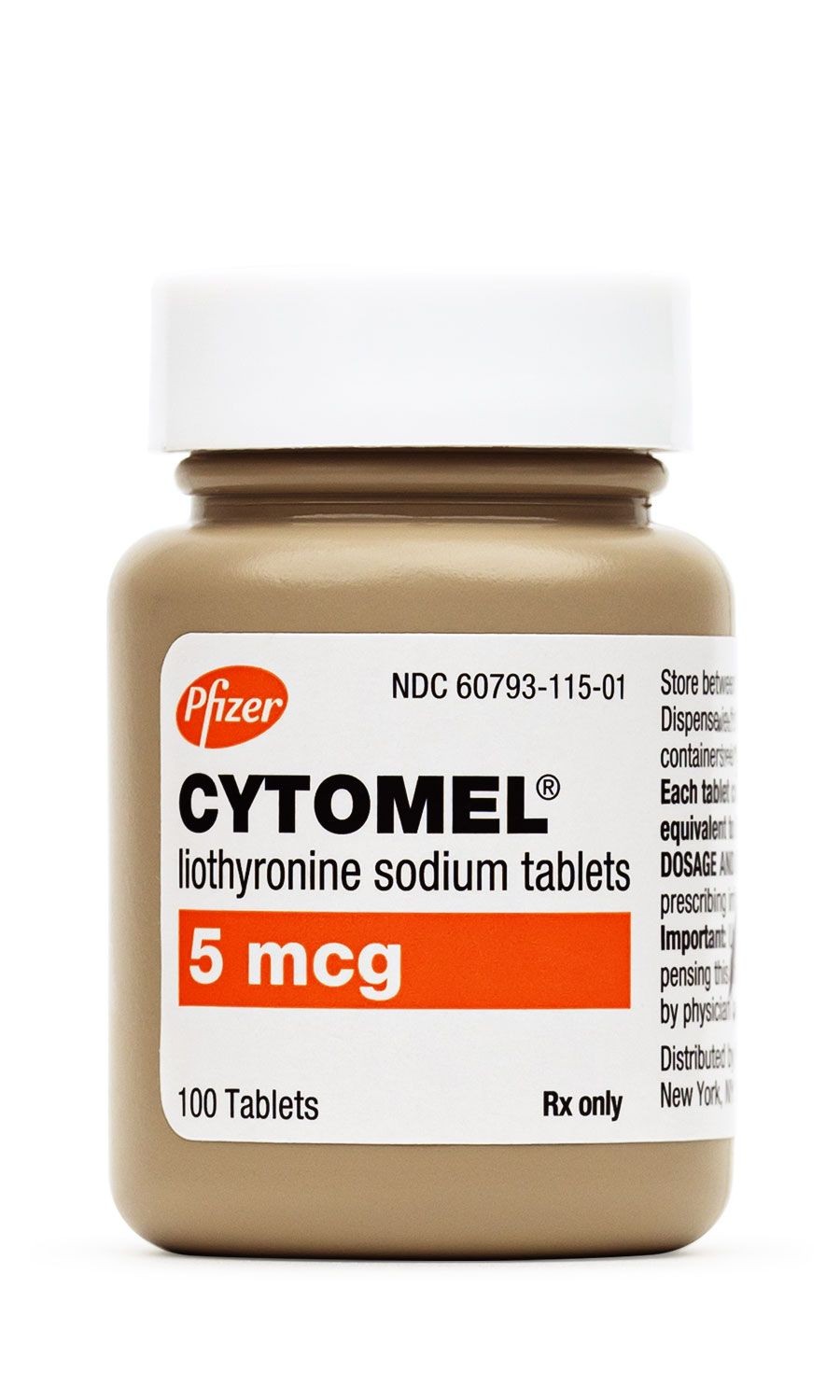
Contents
Side Effects of Cytomel (liothyronine sodium)
Cytomel (liothyronine sodium) is a synthetic (man-made) version of one of the two hormones made by the thyroid gland, triiodothyronine, used to treat individuals who are hypothyroid (do not produce enough thyroid hormones) and prevent various types of euthyroid goiters.
Thyroid hormones increase the metabolism (activity) of all cells in the body. In the fetus, newborn infant and child, thyroid hormones promote growth and development of tissues. In adults, thyroid hormones help maintain brain function, food utilization by the body, and body temperature.
Common side effects of Cytomel include nausea and irregular menstrual cycles.
- toxic (too high) levels of thyroid hormone (hyperthyroidism). Symptoms include chest pain, increased heart rate, excessive sweating, heat intolerance, nervousness, headache, tremor, insomnia, diarrhea, vomiting, weight loss, fever, and rarely, cardiac arrest.
Drug interactions of Cytomel include cholestyramine, which binds Cytomel and other thyroid hormones in the intestine, reducing absorption and levels. Thyroid hormones should not be administered for 4 to 5 hours after cholestyramine.
The administration of Cytomel increases the action of the blood-thinning drug, warfarin.
- By increasing the body’s metabolism, thyroid hormones reduce the body’s ability to clot and enhance the effects of warfarin.
- This can lead to excessive bleeding, so the warfarin dose may need to be reduced.
Cytomel and other thyroid hormones may change the action of many drugs.
- Individuals who are hypothyroid have slower theophylline elimination.
- The elimination of theophylline and similar drugs increases as the dose of thyroid hormone increases.
- Therefore, when the concentration of thyroid hormone is returned to normal with Cytomel, the elimination of theophylline is increased.
- This reduces the concentration of theophylline in the body and can reduce its effectiveness.
Thyroid hormones do not easily cross the placenta and, therefore, are safe for pregnant women to take.
Very small amounts of thyroid hormone may be excreted in breast milk. This is not a serious problem for breastfeeding.
What are the important side effects of Cytomel (liothyronine sodium)?
Liothyronine therapy generally is well-tolerated. If symptoms occur, they usually occur because there are toxic (too high) levels of thyroid hormone (hyperthyroidism).
Symptoms of hyperthyroidism include:
- chest pain, increased heart rate, excessive sweating, heat intolerance, nervousness, headache, tremor, insomnia, diarrhea, vomiting, weight loss, fever, and rarely, cardiac arrest.
Women may also experience irregular menstrual cycles.
Since thyroid hormone affects heart rate and metabolism, the impact of treatment on the control of diseases such as atrial fibrillation, diabetes, and high cholesterol levels should always be considered.
Cytomel (liothyronine sodium) side effects list for healthcare professionals
Adverse reactions, other than those indicative of hyperthyroidism because of therapeutic overdosage, either initially or during the maintenance period are rare. In rare instances, allergic skin reactions have been reported with Cytomel (liothyronine sodium) Tablets.
What drugs interact with Cytomel (liothyronine sodium)?
Oral Anticoagulants
- Thyroid hormones appear to increase catabolism of vitamin K-dependent clotting factors.
- If oral anticoagulants are also being given, compensatory increases in clotting factor synthesis are impaired.
- Patients stabilized on oral anticoagulants who require thyroid replacement therapy should be closely monitored when thyroid is started.
- If a patient is truly hypothyroid, a reduction in anticoagulant dosage will likely be required.
- No special precautions appear to be necessary when oral anticoagulant therapy is begun in a patient already stabilized on maintenance thyroid replacement therapy.
Insulin Or Oral Hypoglycemics
- Initiating thyroid replacement therapy may increase insulin or oral hypoglycemic requirements.
- The effects seen are poorly understood and depend on factors such as dose and type of thyroid preparations and endocrine status of the patient.
- Patients receiving insulin or oral hypoglycemics should be closely monitored during initiation of thyroid replacement therapy.
Cholestyramine
- Cholestyramine binds both T4 and T3 in the intestine, impairing absorption of these thyroid hormones.
- In vitro studies indicate that the binding is not easily removed.
- Therefore, 4 to 5 hours should elapse between administration of cholestyramine and thyroid hormones.
Estrogen, Oral Contraceptives
- Estrogens tend to increase serum thyroxine-binding globulin (TBg).
- In a patient with a nonfunctioning thyroid gland who is receiving thyroid replacement therapy, free levothyroxine may be decreased when estrogens are started, thus increasing thyroid requirements.
- However, if the patient’s thyroid gland has sufficient function, the decreased free thyroxine will result in a compensatory increase in thyroxine output by the thyroid.
- Therefore, patients without a functioning thyroid gland who are on thyroid replacement therapy may need to increase their thyroid dose if estrogens or estrogen-containing oral contraceptives are given.
Tricyclic Antidepressants
- Use of thyroid products with imipramine and other tricyclic antidepressants may enhance antidepressant activity; transient cardiac arrhythmias have been observed.
- Thyroid hormone activity may also be enhanced.
Digitalis
- Thyroid preparations may potentiate the toxic effects of digitalis.
- Thyroid hormonal replacement increases metabolic rate, requiring an increase in digitalis dosage.
Ketamine
- When administered to patients on a thyroid preparation, this parenteral anesthetic may cause hypertension and tachycardia.
- Use with caution and be prepared to treat hypertension, if necessary.
Vasopressors
- Thyroxine increases the adrenergic effect of catecholamines such as epinephrine and norepinephrine.
- Therefore, injection of these agents into patients receiving thyroid preparations increases the risk of precipitating coronary insufficiency, especially in patients with coronary artery disease.
- Careful observation is required.
Drug And Laboratory Test Interactions
The following drugs or moieties are known to interfere with laboratory tests performed in patients on thyroid hormone therapy:
- androgens, corticosteroids, estrogens, oral contraceptives containing estrogens, iodine-containing preparations, and salicylates.
Changes in TBg concentration should be taken into consideration in the interpretation of T4 and T3 values. In such cases, the unbound (free) hormone should be measured.
- Pregnancy, estrogens, and estrogen-containing oral contraceptives increase TBg concentrations.
- TBg may also be increased during infectious hepatitis.
- Decreases in TBg concentrations are observed in nephrosis, acromegaly, and after androgen or corticosteroid therapy.
- Familial hyper- or hypo-thyroxine-binding-globulinemias have been described.
- The incidence of TBg deficiency approximates 1 in 9000.
- The binding of thyroxine by thyroxine-binding prealbumin (TBPA) is inhibited by salicylates.
Medicinal or dietary iodine interferes with all in vivo tests of radioiodine uptake, producing low uptakes which may not reflect a true decrease in hormone synthesis.
The persistence of clinical and laboratory evidence of hypothyroidism, in spite of adequate dosage replacement, indicates either poor patient compliance, poor absorption, excessive fecal loss, or inactivity of the preparation. Intracellular resistance to thyroid hormone is quite rare.
Summary
Cytomel (liothyronine sodium) is a synthetic (man-made) version of one of the two hormones made by the thyroid gland, triiodothyronine, used to treat individuals who are hypothyroid (do not produce enough thyroid hormones) and prevent various types of euthyroid goiters. Common side effects of Cytomel include nausea and irregular menstrual cycles. Thyroid hormones do not easily cross the placenta and, therefore, are safe for pregnant women to take. Very small amounts of thyroid hormone may be excreted in breast milk. This is not a serious problem for breastfed infants.


